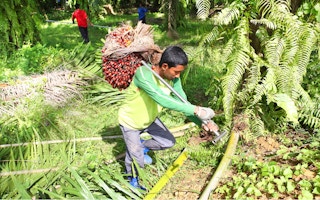Malaysian financial services group CIMB has updated its decarbonisation plan with industry-first targets for the palm oil industry.
To continue reading, subscribe to Eco‑Business.
There's something for everyone. We offer a range of subscription plans.
- Access our stories and receive our Insights Weekly newsletter with the free EB Member plan.
- Unlock unlimited access to our content and archive with EB Circle.
- Publish your content with EB Premium.
Southeast Asia’s fifth-largest bank is aiming to reduce the emissions intensity of its palm portfolio by 16 per cent, to 1.52 tonnes of carbon dioxide equivalent per tonne of certified palm oil by 2030. The bank says this is equivalent to a 2 per cent annual reduction in the emissions of its palm porfolio.
The target is based on the Science-Based Targets Initiative (SBTi)’s guidance for forest, land and agriculture, which includes Scope 1 and 2 emissions from plantation and milling clients, and Scope 3 emissions from clients’ sourcing fresh fruit bunches (FFB) from suppliers.
The palm sector – which has a vast carbon footprint linked to deforestation and the exploitation of carbon-rich peatlands – covers around 3 per cent of CIMB’s total group gross loans, and almost exclusively covers the bank’s clients in Malaysia and Indonesia, the world’s two largest palm oil producing countries.
The new sectoral targets tie in with the bank’s No Deforestation, No Peat, and No Exploitation (NDPE) commitment launched in 2022, where clients with new plantations must conduct a High Conservation Value (HCV) assessment and commit to the conservation of HCV and peat areas before clearing land for planting.
CIMB said it will engage with its clients to shift production towards certified sustainable palm oil, adopt better agricultural practices to boost yields and reduce operational greenhouse gas emissions, and improve the quality and coverage of emissions reporting.
It added that its palm oil clients are also responsible for safeguarding the rights of local communities, workers and smallholder farmers.
What about smallholders?
However, none of CIMB’s clients are smallholder farmers, which make up 40 per cent of the sector by production volume in Malaysia and Indonesia. Smallholders have long struggled to access affordable financing to farm more sustainably and are routinely blamed for transboundary haze from slash and burn forestry that blights the region every year.
Carolyn Lim, senior manager of corporate communications for palm oil company Musim Mas, told Eco-Business she hopes that banks would consider microfinancing for smallholders’ replanting efforts. When palm trees reach a certain age they become unproductive and must be replanted. Without access to financing, some smallholders clear forests to expand their plantations rather than replant trees.
CIMB told Eco-Business that smallholders typically work in rural areas and are “generally speaking not within our existing base of clients”. As such, the bank’s only contact with smallholders is through its large corporate clients who purchase FFB from them.
The bank said it is in the early stages of engaging with its palm oil clients on how they can support smallholders to work towards sustainability certification.
It added that it is exploring how it can boost smallholder certification through sustainability-linked supply chain financing for corporates’ smallholder suppliers. Such facilities would give preferential rates to small- to medium-sized enterprises that can demonstrate they meet increasing sustainability goals.
Aida Greenbury, sustainability advisor to Indonesian independent smallholders union SPKS, said banks could better support smallholders with a mix of grants and low-interest impact investments, in partnership with the bank’s large palm oil clients, to enable smallholders to adopt best practices.
“I believe that banks should support deforestation-free smallholders, to build smallholder-managed mills, to mitigate the environmental, social, and commercial risks associated with palm oil supply and trade,” she said.
Power plan
CIMB has also set new targets for its power porfolio. The bank has set an interim Scope 1 emissions target for its power clients in line with the International Energy Agency’s 2023 Net Zero Roadmap scenario.
The group is targeting a cut in the emissions intensity of its power portfolio by 38 per cent, to meet an emissions intensity target of 272 kilogrammes of carbon dioxide equivalent per megawatt hour generated by 2030.
The new targets are an extension of the net zero target the bank set in September 2022, which includes achieving net-zero emissions for Scopes 1 and 2 in operations by 2030 and hitting net zero, including Scope 3 emissions, by 2050.
CIMB committed to stop financing coal power completely by 2040 in 2020, which was the strongest coal commitment for a Southeast Asian bank at the time. Singapore’s major banks, led by DBS Bank, pledged to exit coal by 2039 a year later.
None of Southeast Asia’s bank have been able to get their net zero targets approved by SBTi, the gold standard of decarbonisation target-setting which requires a steep reduction in fossil fuels financing to align the sector with the Paris climate accord.

















